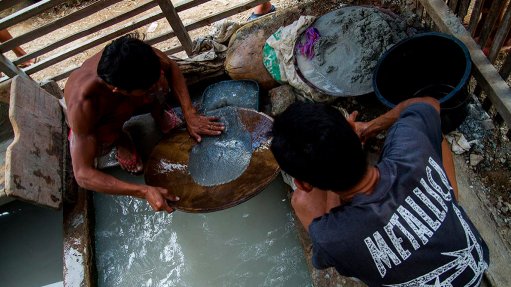
HARMFUL SUBSTANCE Exposure to mercury can have serious health impacts including irreversible brain damage
Photo by: Human Rights Watch
The Intergovernmental Forum on Mining, Metals, Minerals and Sustainable Development (IGF) has welcomed the “successful adoption” of the Minamata Convention on Mercury, which came into force on August 16.
“The convention is a crucially important global treaty aimed at protecting human health and the environment from the adverse effects of mercury use,” says IGF programmes deputy director Matthew Bliss.
He points out that 51 of the IGF’s 60 member States have already signed or ratified the Minamata Convention.
Major highlights of the agreement include a ban on new mercury mines and the phasing out of existing ones; the phase-out and phase-down of mercury use in a number of products and processes; control measures on emissions into the air and on releases onto land and into water; and the regulation of the informal artisanal and small-scale mining (ASM) sector.
In addition, the convention addresses the interim storage of mercury and its disposal once it becomes waste, addressing those sites contaminated by mercury and the associated health issues of mercury use.
Bliss elaborates that mercury use remains widespread in the mining sector, particularly among informal ASM operations. He highlights that it remains cheap and easy to use, which are two “very important” considerations for miners who often struggle to support themselves and their families.
Bliss laments that, unfortunately, mercury is not always used and disposed of in a safe and secure way. He remarks that ASM is the source of the largest releases of mercury, which was estimated at 1 400 t/y in 2011, according to the Minamata Convention.
Bliss comments that exposure to mercury can have serious health impacts, including irreversible brain damage. Further, he says that mercury is also difficult to contain and can be toxic in even very small doses.
He emphasises that it can be transported over long distances by air or water, poisoning the soil and waterways and eventually making its way into the food chain.
Nevertheless, Bliss notes that, for many miners, the immediate benefits of mercury use, which enables them to put food on their tables and a roof over their heads, outweigh the long-term health risks to themselves and local communities.
He says that the IGF’s Mining Policy Framework addresses the need for “ending or reducing the use of mercury” when possible and for “improving the management of mercury and other toxic substances when it is not possible to eliminate them”.